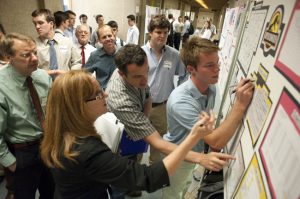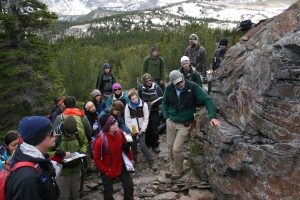Future of Undergraduate Geoscience Education
The Future of Undergraduate Geoscience Education initiative, sponsored by the National Science Foundation, addresses three critical questions facing undergraduate geoscience education:
- What concepts, skills, and competencies do undergraduates need to succeed in graduate school and/or the future workforce?
- What are the best teaching practices and most effective use of technology to enhance student learning?
- How do we recruit, retain, and ensure the success of a diverse and inclusive community of geoscience majors and support K–12 science teachers to contribute to a well-informed public and dynamic geoscience workforce?
Since 2014 over 1000 geoscientists in the academic and employer communities have collectively developed a robust vision for the Future of Undergraduate Geoscience Education. The Vision and Change report articulates that vision and identifies strategies for transformative change in undergraduate geoscience education.
Vision and Change: View the full report online, download a PDF version, and access a Toolkit for implementing the vision.
[Full reference: Mosher, S., & Keane, C. (Eds.). (2021). Vision and change in the geosciences: The future of undergraduate geoscience education. American Geosciences Institute. Authors: Sharon Mosher, Wendy Harrison, Jacqueline Huntoon, Christopher Keane, David McConnell, Kate Miller, Jeff Ryan, Lori Summa, Joshua Villalobos, Lisa White.]
The Future of Undergraduate Education Initiative: 2014 – 2020
The national initiative on the Future of Undergraduate Geoscience Education developed a community vision for undergraduate geoscience education through input from over 1000 geoscience employers and academics from across the country and support from the National Science Foundation. We have identified those conceptual understandings, skills, and competencies needed by undergraduate geoscience students to prepare them for the future workforce and best practices for achieving these student learning outcomes. We began implementing the community vision into undergraduate programs and developing best practices for curricular and program change. Vision and Change in the Geosciences is a comprehensive report of the outcomes, recommendations for change, and case studies from departments that have implemented these results.
The Summits and Workshops are described below, in chronological order, with links to the talks, Powerpoints, discussions, and other related information for each event. Results of the online survey are also available.
Summit on the Future of Undergraduate Geoscience Education: January, 2014
This NSF sponsored summit brought together a broad spectrum of the undergraduate geoscience education community, ~200 educators from R1 research universities with undergraduate programs, four-year private and state colleges (4YC), and 2-year community colleges (2YC) from across the country, as well as representatives from industry and professional geoscience societies. The summit focused on three main topics:
- What content, competencies, and skills do undergraduates need to be successful in graduate school and the future workforce?
- What are the best ways of teaching and using technology to enhance student learning?
- How can we broaden participation and retention of underrepresented groups and prepare K-12 science teachers to build a robust, diverse and informed future geoscience workforce?

The Summit was the first step in developing a high-level community vision for undergraduate geoscience education and resulted in widespread collective agreement presented in a Summary Report. All parts of the Summit (Keynote presentations, panel discussions and entire group discussions) can be viewed at: Webcast Archive. A presentation of the Summit outcomes was presented for an AGU/AGI Webinar for Heads and Chairs in Fall, 2014: http://www.youtube.com/watch?v=QmCYaATD4eo
Geoscience Community Survey
The online survey of the geoscience community has had ~455 respondents so far with: 354 academics (78%), 76 industry (17%), 13 government agencies (3%), 7 other (1%), 5 professional society representatives (1%). Of these, 85% were not Summit participants, indicating that between the ~200 Summit participants and the ~390 non-participant survey respondent, we are receiving input from a large segment of the geoscience community. The gender distribution on the survey is 308 male and 147 female.
Survey Results are available that summarize the community’s views on the skills, competencies, and conceptual understandings needed for graduate school and/or the future workforce and he status departments in terms of curriculum reform, use of various teaching methods, and constraints on their programs.
Geoscience Employers Workshop: May, 2015
The Geoscience Employers Workshop provided valuable input from geoscience employers on the skills, concepts and conceptual understandings needed by undergraduates for the current and future workforce and the role of employers in helping departments implement the developing community vision. Overall there was strong agreement with Summit and survey outcomes regardless of type of employer, and in addition to their own views, they provided more granularity on skills and concepts. The 46 participants included an even distribution of employers from the petroleum industries; hydrology, engineering and environmental consulting companies; and federal agencies that employ geoscientists, along with representatives from some of the geoscience professional societies. One participant represented the mining. Results are available in a Geoscience Employers Workshop Summary and a presentation given for a AGU/AGI Heads and Chairs webinar on October 9, 2015 and the Earth Educators Rendezvous in July, 2015.
Department Heads & Chairs Summit on the Future of Geoscience Undergraduate Education: January 2016
Now Available: Summary of Action Plan Progress Reports
September AGU/AGI Heads and Chairs Webinar: Outcomes and Next Steps from the Summit for the Future of Undergraduate Geoscience:
- PowerPoint
- Webinar recording (YouTube)

This NSF-sponsored summit brought together ~100 geoscience academic leaders from R1 research universities with undergraduate programs, four-year private and state colleges (4YC), and 2-year community colleges (2YC) from across the country. The summit participants discussed the developing community vision for undergraduate geoscience education and developed strategies for implementing this vision in departments across the country. Over the past two years, we have engaged a diverse spectrum of the geoscience academic and employer community in a comprehensive review of the skills, competencies, and conceptual understandings needed in geoscience undergraduate programs, the best methods of producing these learning outcomes, and how to best broaden, recruit and retain undergraduate geoscience students, especially underrepresented groups (see below). This summit was specifically designed for administrative leaders who have the ability to make and lead change.
Summit Materials, PowerPoints and Webcast Archive
Heads/Chairs Workshop on the Future of Undergraduate Geoscience Education, Earth Educators Rendezvous, July 2017
A workshop for Department Heads and Chairs was held this summer at the Earth Educators Rendezvous for both participants and non-participants in the 2016 Heads/Chairs Summit. Those who were participants had the opportunity to discuss their progress, provide insight and advice on successful and unsuccessful strategies, and further develop on their own action plans. New participants had the opportunity to discuss results of this national effort, learn strategies for implementing changes in undergraduate programs, and develop an action plan for their own department. For additional information: PowerPoints including resources for curriculum re-design and assessment
